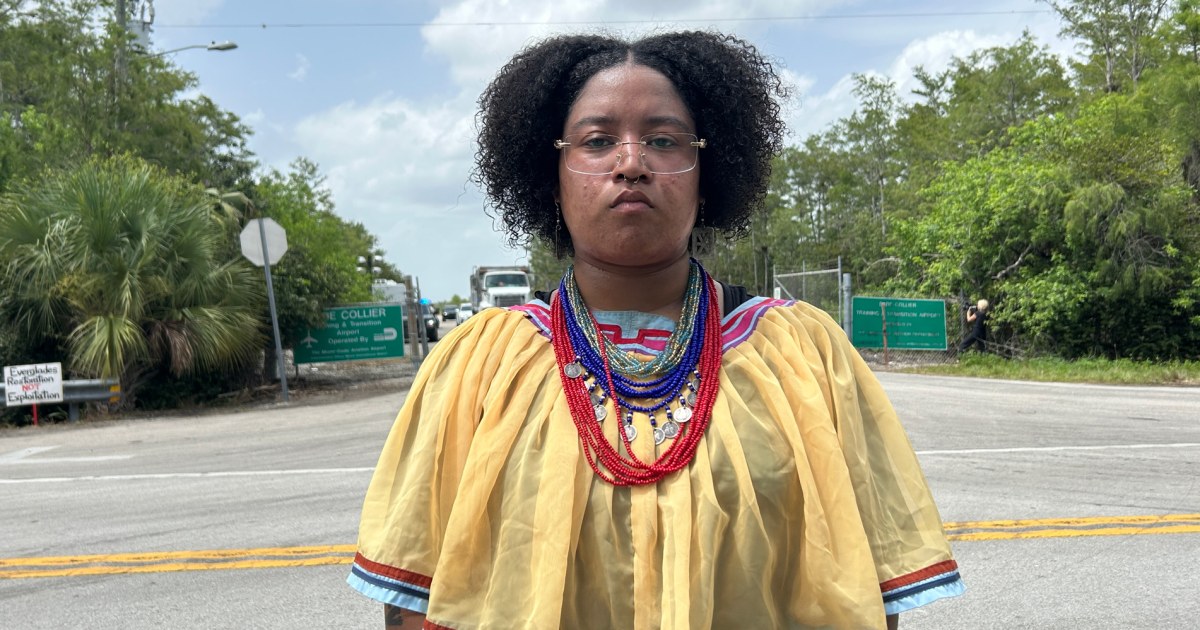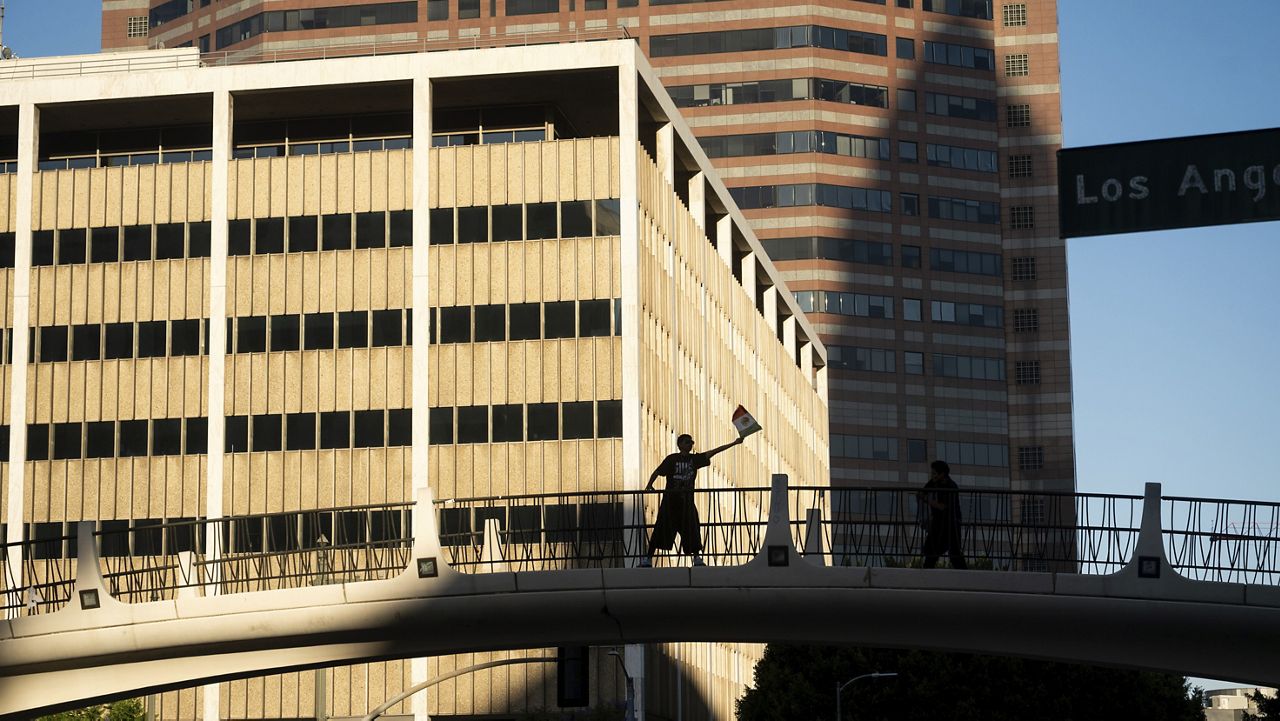In an effort to fulfill the Trump administration’s daily immigration arrest “quotas,” federal agents and deputized local law enforcement are racially profiling and snatching people off the streets without due process. These arrests, carried out by armed and masked agents, are sowing terror and confusion in communities across the United States. Stephano Medina, a lawyer with the California Center for Movement Legal Services, shares how ICE regularly denies that it has taken people into custody, leading to family members scrambling for information about their loved ones. “It’s arrest now, ask questions later,” adds Dominique Boubion, an attorney representing Andrea Velez, a U.S. citizen who was taken by ICE last month in what Velez has since described as a “kidnapping.”
AMY GOODMAN: This is Democracy Now!, democracynow.org.
We go now to Los Angeles, where armed, masked federal agents have spent the last month carrying out arrests across the city. Families, immigrant advocates say they’re struggling to find their loved ones when they are disappeared. In one case, the family of a community activist and mother, Yuriana Juliana — they call her “Juli” — Pelaez Calderon, said she was taken at gunpoint on June 25th by two men in unmarked cars who pulled over as she went to work at night, which is uncommon. She used a borrowed phone to call her family to say she was taken to a warehouse where women are held alongside men. She compared the men who took her to bounty hunters and has not had proper food or access to her medication.
This is Stephano Medina, managing attorney with the L.A. office of California Center for Movement Legal Services.
STEPHANO MEDINA: So, DHS is out now saying that this is a hoax and that this is all made up, because they don’t have any record of Juli in their system, which I don’t doubt she’s not in their system. But Juli, in that phone call that she made to her family from a borrowed phone, told us that she was taken directly from where she was picked up in South Central Los Angeles to San Isidro, where she was presented to an ICE official and pressured to sign a voluntary self-deportation agreement.
AMY GOODMAN: Medina says Juli’s family filed a missing persons report with the L.A. Police Department as they continued their search for her.
Meanwhile, the family of Andrea Velez, a U.S. citizen, described her arrest by ICE last month as a “kidnapping.” Andrea had just been dropped off at work by her mom and her sister, when the pair witnessed masked federal agents grabbing her and taking Andrea in an unmarked car during an immigration raid. One video shows a masked agent lifting Andrea off the ground and carrying her away. Andrea’s sister, Estrella Rosas, spoke with CBS News Los Angeles.
ESTRELLA ROSAS: They didn’t have vests that said ICE or anything. Their cars didn’t have license plates. … Just because of the color of our skin, they think that we’re criminals. My sister was there, so they were like, “Oh, she looks Hispanic, so let’s take her, too.”
AMY GOODMAN: Ultimately, Andrea Velez was released, but was charged with assaulting a federal officer during her arrest. She spoke at a news conference last week.
ANDREA VELEZ: They didn’t identify themselves. I can’t go through it, but yeah, it was — I was just going to work. It was just a day of work, and, like, everything happened so fast. So, yeah, and they didn’t identify themselves, so I was kind of scared.
AMY GOODMAN: For more, we’re joined in Los Angeles by Dominique Boubion. She is an attorney helping to represent Andrea Velez.
This is just such an astounding story. Dominique, can you explain what happened, as we watch her being carried with their arms under her chest, as she — walking forward? Where was she taken? Where was she held? How did you find out when she was disappeared and her family panicked?
DOMINIQUE BOUBION: Yes, of course. So, we were contacted by the family later that day, in the afternoon, because they had seen — the mother had seen her daughter being taken by ICE agents and hadn’t — but didn’t know they were ICE, had no idea who they were, and so they were terrified and looking for help just to locate her. And the video that you mentioned where she’s being lifted and carried up, that’s actually when she went to the police officers at LAPD asking for help, telling them, “These men are taking me.” So, I’ll back up and explain what happened.
AMY GOODMAN: Wait, wait, wait. If you can explain that point? We’re watching her being carried. Who is carrying her? And I do see police. I see the police cars, the LAPD. Who is carrying her?
DOMINIQUE BOUBION: So, that is an ICE agent. We now know it’s an ICE agent. And she was being carried away from the LAPD officers that she went over to for help, because she didn’t know who the men were or where she was being taken. She had no idea.
That morning, just minutes before, her mother had dropped her off at work on 9th and Main, downtown L.A. And as she exited the vehicle, she walked three, four steps onto the sidewalk, and suddenly there was a swarm of vehicles surrounding her. So, as she’s kind of getting her bearings what’s going on, she sees vendors over to her right, and she assumes, “OK, this must be — maybe it’s a raid. I don’t know.” She sees men approaching them. But she looks to her left, and she sees an ICE agent about 10 feet away, running full speed at her, and becomes terrified. She’s 4’11”. This is a man who, in her estimation, is over six feet. He’s masked. And he does not stop. So she becomes — she gets scared, and her reaction is to cover and block herself to protect herself, and she’s thrown to the ground.
The ICE agent continues on for about another 10, 15 seconds to get their target, and then returns and tells her she’s under arrest for what she describes as interfering. She gets put into a vehicle, a van, an unmarked van, and she’s in handcuffs. And while she’s waiting, she sees the officer, so she walks over to the officer and asks if he would help her. She doesn’t know who these men are. And that’s when you see the ICE agent pick her up and take her back to the unmarked van.
AMY GOODMAN: Why was she picked up, Dominique?
DOMINIQUE BOUBION: She — physically picked up, or why was she arrested?
AMY GOODMAN: Arrested.
DOMINIQUE BOUBION: So, what she is being charged with is assault on a peace officer. So, the version of the story that the federal agent is putting forth is that Andrea Velez purposefully walked into his path in order to protect whoever their target was, and knocked that ICE agent off balance and hit him in the head. It’s a complete fabrication, didn’t happen. And it, I believe, is more of a, number one, racial profiling. They were speaking to her in Spanish, even though she was demonstrating that she was — could speak fluent English and that she was a U.S. citizen. And I think it was a matter of “Let’s see if she is a U.S. citizen. And if she is, then we’ll slap on these charges.” It’s an issue of — it’s arrest now, ask questions later.
AMY GOODMAN: So, straight-up racial profiling?
DOMINIQUE BOUBION: A hundred percent. A hundred percent. Andrea Velez has — she’s a darker-skinned Latino. And 100%, I believe that this was racial profiling.
AMY GOODMAN: We have to leave it there. We’ll continue to follow this case, Dominique Boubion, one of the attorneys helping to represent Andrea Velez, a U.S. citizen arrested by ICE. I’m Amy Goodman. Thanks so much for joining us.









